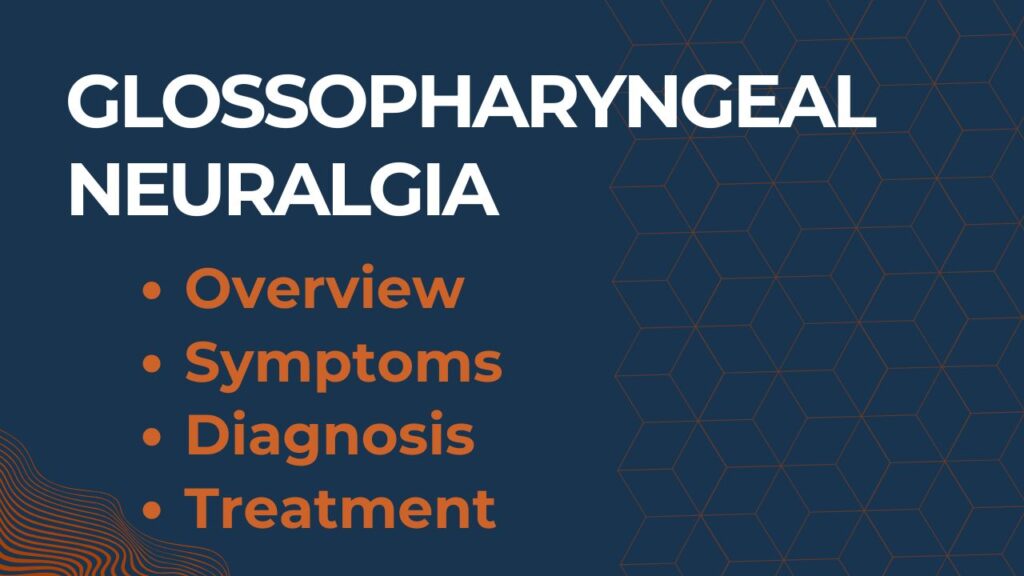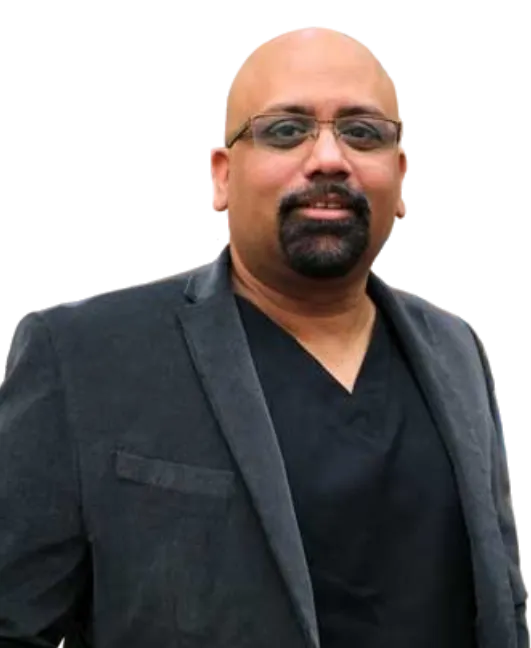Glossopharyngeal Neuralgia
Conditions, Symptoms, Diagnosis, Treatment and Best Options and Best Surgeon for Glossopharyngeal Neuralgia Treatment in Pune
Imagine a searing, electric-shock-like pain that strikes deep in your throat, especially when you swallow. This excruciating agony can radiate into your tongue, tonsil area, or even your ear. This rare and often misunderstood condition is called Glossopharyngeal Neuralgia (GPN), affecting the ninth cranial nerve (glossopharyngeal nerve). While it is less common than Trigeminal Neuralgia, the pain it causes is just as debilitating, making simple acts like eating, drinking, or even talking a terrifying ordeal.
Patients suffering from Glossopharyngeal Neuralgia often endure a long and frustrating journey seeking diagnosis and relief. In Pune, India, Dr. Jaydev Panchwagh, a neurosurgeon with extensive experience in nerve compression syndromes and a globally recognized expert in Microvascular Decompression (MVD) surgery, offers a path to accurate diagnosis and effective, often permanent, treatment for this agonizing condition.

What is Glossopharyngeal Neuralgia?
Glossopharyngeal Neuralgia (GPN) is a rare pain disorder that affects the glossopharyngeal nerve, also known as the 9th cranial nerve. This nerve is responsible for transmitting sensation from the back of the throat, tonsils, tongue (back one-third), and middle ear to the brain. It also plays a role in swallowing and taste.
Similar to Trigeminal Neuralgia and Hemifacial Spasm, the most common cause of Glossopharyngeal Neuralgia is compression of the glossopharyngeal nerve by a nearby blood vessel (usually an artery, like the posterior inferior cerebellar artery, or sometimes a vein) as it exits the brainstem. The constant pulsation of this vessel against the nerve irritates and damages its protective covering (myelin sheath), causing the nerve to send abnormal pain signals.
Less common causes can include:
- A tumor (though rare) compressing the nerve.
- Cysts or other lesions in the region of the nerve.
- Rarely, structural abnormalities at the base of the skull.
Dr. Jaydev Panchwagh emphasizes the importance of identifying the specific cause of the compression to determine the most effective and lasting treatment.
- Symptoms
- Causes and Risk
- Diagnosis
- Treatment
The hallmark symptom of Glossopharyngeal Neuralgia is the characteristic, severe pain that typically occurs on one side of the throat. Based on Dr. Jaydev Panchwagh’s experience, common symptoms and characteristics include:
- Excruciating, Electric Shock-like Pain: The pain is usually described as sudden, sharp, stabbing, burning, or an electric shock sensation.
- Location: Primarily affects one side of the throat, especially the tonsil area, back of the tongue, and deep in the ear. It can also radiate to the jaw or neck.
- Triggered by Swallowing: This is a key diagnostic feature. The pain is frequently and intensely triggered by:
- Swallowing (solids, liquids, or even saliva)
- Chewing
- Talking
- Coughing
- Yawning
- Sneezing
- Brief Attacks: Each pain attack typically lasts from a few seconds to a few minutes, but they can occur in rapid succession, making daily activities impossible.
- Periods of Remission: Initially, patients might experience periods of pain-free remission, but over time, these periods tend to shorten, and the attacks become more frequent and severe.
Patients with GPN often avoid eating and drinking due to the severe pain, leading to weight loss and dehydration. The constant fear of triggering an attack can profoundly impact their mental well-being and social life.
As highlighted, the predominant cause of Glossopharyngeal Neuralgia is vascular compression of the glossopharyngeal nerve. The continuous pulsation of an artery or vein against the nerve at its root entry zone into the brainstem leads to chronic irritation and damage, resulting in the abnormal firing of pain signals.
Other less common causes that need to be ruled out during diagnosis include:
- Tumors: A growth (benign or malignant) in the brain or neck region that directly presses on the glossopharyngeal nerve.
- Cysts or Aneurysms: Rarely, a cyst or an abnormal bulging blood vessel (aneurysm) might cause compression.
- Structural Abnormalities: Bony abnormalities at the base of the skull.
- Multiple Sclerosis: Very rarely, it can be a symptom of Multiple Sclerosis, where the nerve’s myelin sheath is damaged.
Age can be a contributing factor, as the condition most commonly affects adults over 40, likely due to blood vessels becoming more tortuous (curved) and prone to contact with nerves as one ages.
Diagnosing Glossopharyngeal Neuralgia can be challenging due to its rarity and the overlap of symptoms with other conditions like tonsillitis, dental problems, or other forms of facial pain. Dr. Jaydev Panchwagh emphasizes a careful and systematic diagnostic process:
- Detailed Medical History and Symptom Review: This is the most crucial step. The neurosurgeon will meticulously question the patient about the exact nature, location, triggers, and severity of their pain. The characteristic triggering of pain by swallowing is a strong indicator.
- Neurological Examination: A thorough examination to assess the function of cranial nerves, including swallowing reflexes, sensation in the throat, and to rule out any neurological deficits.
- Imaging Tests (MRI): An MRI of the brain, particularly with specialized sequences that can visualize cranial nerves and surrounding vessels (like 3D FIESTA or CISS sequences), is essential. This helps to:
- Identify Vascular Compression: In many cases, the MRI can directly show a blood vessel compressing the glossopharyngeal nerve.
- Rule Out Other Causes: Crucially, it helps to exclude other potential causes such as tumors, cysts, or lesions that might be irritating the nerve.
- Ruling out other conditions: Given the symptoms, ENT (Ear, Nose, Throat) evaluation may also be part of the diagnostic journey to exclude local throat pathologies. If a tumor is suspected, further specialized imaging might be required. Elongated Styloid process and Eagle’s syndrome are differential diagnoses.
Sometimes, a diagnostic nerve block (an injection of anesthetic near the nerve) might be performed. If this temporarily relieves the pain, it further supports the diagnosis of Glossopharyngeal Neuralgia.
The primary goal of Glossopharyngeal Neuralgia treatment is to alleviate the severe pain and significantly improve the patient’s quality of life. Treatment options range from medication to advanced surgical interventions. Dr. Jaydev Panchwagh, with his vast experience in MVD surgery for similar nerve compression syndromes, focuses on providing definitive and lasting relief.
- Medication:
- First-Line Treatment: Anticonvulsant medications, similar to those used for Trigeminal Neuralgia (e.g., Carbamazepine, Oxcarbazepine), are typically the initial treatment. They work by calming the abnormal nerve impulses.
- Adjunctive Medications: Other drugs like Gabapentin or Baclofen may be used to enhance pain control.
- Limitations: While medications can provide initial relief, they often lose effectiveness over time, requiring increasing doses. These higher doses frequently lead to side effects such as drowsiness, dizziness, nausea, and cognitive issues, which can be difficult to tolerate long-term. Medications only mask the symptom and do not address the underlying cause of the nerve compression.
- Surgical Options (Best Options for Long-Term Relief/Cure):
- Microvascular Decompression (MVD) Surgery:
- The Gold Standard and Potentially Curative: MVD is widely recognized as the most effective long-term treatment and the only potentially curative option for Glossopharyngeal Neuralgia caused by vascular compression. Dr. Jaydev Panchwagh is an international expert in MVD surgery, having performed over 2900 MVD procedures for conditions like Trigeminal Neuralgia, Hemifacial Spasm, and also Glossopharyngeal Neuralgia. This vast experience makes his center a “Centre of Excellence” for these nerve compression syndromes.
- How it Works: Performed under a neurosurgical microscope, a small opening is made behind the ear. The neurosurgeon carefully accesses the glossopharyngeal nerve where it exits the brainstem. The offending blood vessel (usually an artery) that is compressing the nerve is gently identified and moved away. A small, inert, permanent Teflon sponge is then inserted between the nerve and the vessel to keep them separated, thereby relieving the pressure and allowing the nerve to heal.
- Benefits: MVD directly addresses the root cause of the pain, offering immediate or rapid and often permanent pain relief in a high percentage of patients. It preserves the nerve’s function, aiming to avoid permanent numbness or other deficits in the throat area. Dr. Panchwagh’s strong advocacy for MVD as an early intervention for suitable candidates stems from its high success rates and ability to free patients from the debilitating side effects of long-term medication.
- Radiofrequency Ablation/Rhizotomy:
- Destructive Procedure: This involves inserting a needle through the side of the neck to deliver radiofrequency energy to a part of the glossopharyngeal nerve, selectively destroying the pain-carrying fibers.
- Considerations: While minimally invasive and offering quicker relief, it is a destructive procedure that can result in permanent numbness in the throat and potentially affect swallowing. Pain can recur after some time. It is generally considered for patients who are not candidates for MVD or if MVD fails. This is however not a procedure that is free of risks, and therefore must be undertaken with complete knowledge. In fact MVD may be a relatively safer option in experienced hands.
- Microvascular Decompression (MVD) Surgery:
Watch this Video to Know More about Glossopharyngeal Neuralgia
Why Choose Dr. Jaydev Panchwagh for Glossopharyngeal Neuralgia Treatment?
Given the rarity and complex nature of Glossopharyngeal Neuralgia, seeking a neurosurgeon with specialized expertise is essential and crucial. Dr. Jaydev Panchwagh is highly regarded for his contributions to the field of MVD surgery and offers distinct advantages for GPN patients in Pune, India.
- Pioneering MVD Experience: Dr. Panchwagh’s extensive record of over 2900MVD surgeries for various cranial neuralgias, including Glossopharyngeal Neuralgia, makes him one of the most experienced MVD surgeons globally. This volume of experience directly translates to refined surgical skill and consistent, high success rates.
- Definitive and Curative Approach: He advocates for MVD as the most effective and often permanent solution for GPN caused by vascular compression, aiming to free patients from agonizing pain and the dependency on medications with their side effects.
- Precision Microsurgery: His expertise in advanced microsurgical techniques ensures the delicate and precise separation of the nerve and blood vessel, minimizing risks to surrounding critical structures and preserving nerve function.
- Comprehensive Diagnostic Workup: Dr. Panchwagh employs state-of-the-art imaging to accurately diagnose GPN and rule out other causes, ensuring the most appropriate treatment plan.
- Patient-Focused Care: He is committed to providing thorough education and compassionate counseling to patients and their families, ensuring they are well-informed and supported throughout their treatment journey.
- International Patient Trust: Patients from various countries choose his center for complex nerve compression disorders, a testament to his international reputation and trusted outcomes.
Frequently Asked Questions (FAQs) about Glossopharyngeal Neuralgia
They are both types of neuralgias affecting cranial nerves, caused most commonly by vascular compression, and often treated effectively by MVD surgery. However, they affect different nerves and cause pain in different facial/oral areas.
While medication can manage symptoms temporarily, it doesn’t address the underlying cause. Over time, effectiveness may decrease, and side effects can become debilitating. MVD offers the potential for a permanent solution, freeing you from medication and their side-effects.
Recovery from MVD is generally similar to that for Trigeminal Neuralgia or Hemifacial Spasm. Most patients are discharged within 2-4 days and can typically return to light activities within a few weeks. Dr. Panchwagh’s team provides detailed post-operative care instructions.
The goal of MVD is to relieve pain while preserving nerve function. While there’s a very small risk of temporary changes, in the vast majority of successful MVD cases by an experienced surgeon like Dr. Panchwagh, swallowing function is preserved or improves as the nerve recovers.
Living with Glossopharyngeal Neuralgia can be agonizing and isolating. However, with the specialized expertise and advanced surgical techniques offered by Dr. Jaydev Panchwagh, lasting relief and a return to a normal, pain-free life are genuinely possible.
Get a Second Opinion from a Specialist

A distinguished Brain and Spine Surgeon, shaping neurosurgical care in Pune, Maharashtra, India for over two decades.
Quick Link

Quick Contacts
- Phone : (+91) 9011333841 , (+91) 7720948948
- brainspine66@gmail.com
- 102, Bhagyatara Society, 1st floor, Mehendale Garage road, Erandwane, Pune
Map
- Copyright @2025 | Dr. Jaydev Panchwagh | Praavi Medicare
